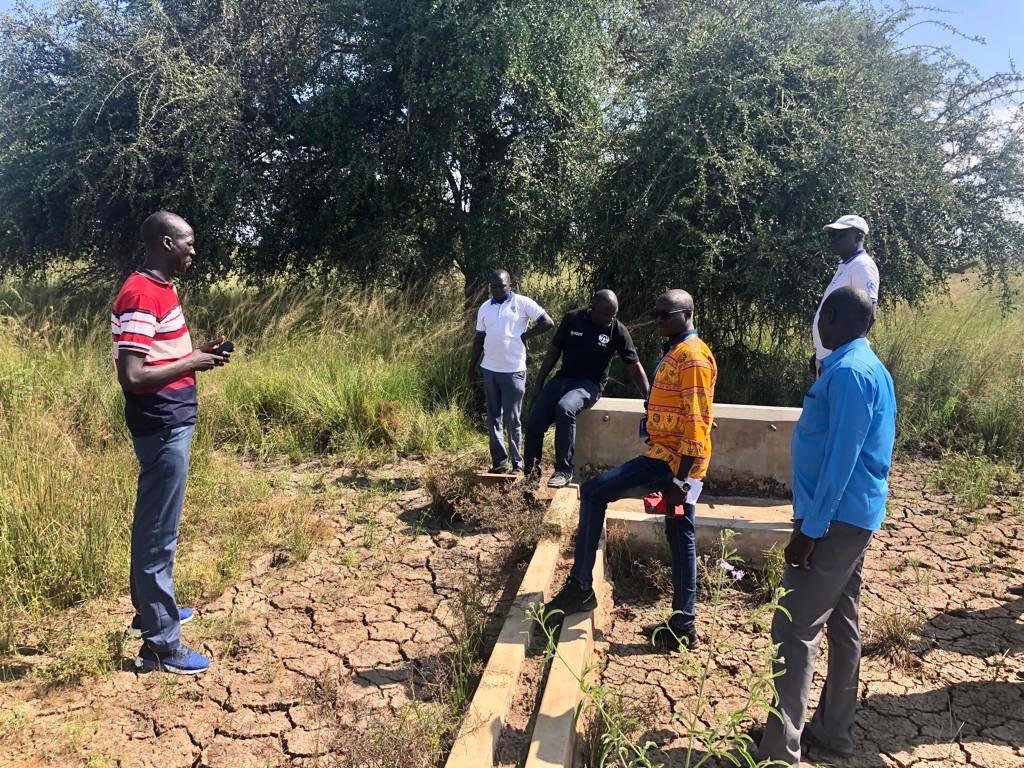Innovating food security with smallholder farmers in South Sudan
How solar-powered water systems are supporting climate change-impacted farmers
One of the solar-powered water systems Rainmaker has set-up in South Sudan. Photo: Omaski Ltd.
In the Tonj region of western South Sudan, record flooding — worsened by climate change — has destroyed crops and grazing areas, and threatened the livelihoods of the 95 percent of people who depend on farming and cattle herding. COVID-19 shutdowns and food supply chain breakdowns have only compounded extreme hunger and displacement. Here, The Rainmaker Enterprise, a locally-led organization is building lasting solutions, starting with access to water for smallholder farmers impacted by climate change.
Secure access to water is central to building community health, restoring food production, improving livelihoods, and reducing migration pressures. Near the remote community of Thiet, Rainmaker has installed a solar-powered water supply system, which provides over 3,000 people in the surrounding area with water for safe drinking, watering livestock, and irrigated farming.
“(The water system) has reduced diseases and solved the water shortage in our community,” says Luka, a local community member.
“I have made a vegetable garden which will bring income and I will use Rainmaker’s water to water it in the dry season,” says Letdit, another community member. “I will also make bricks which will also bring income.”
Community members are employed on Rainmaker’s farm, and youth are trained on maintenance of the solar irrigation system.
Smallholder farmers participate in a meeting on Rainmaker’s tractor-for-hire service. Photo: Mathok Kur
Local farmers with Rainmaker’s irrigation system, which enables dry season farming. Photo: Mathok Kur
“It’s unheard of in the region for people to engage in any large scale farming activities during the dry season,” explains James Thuch Madhier, Rainmaker’s Founder and Executive Director, and a native of Thiet village. “The solar water system allows us to have two major growing seasons instead of one, offsetting the negative impacts of climate change and keeping the land active. Heavy flooding has impacted crops this year, and when flood waters recede and drought sets in, food insecurity is projected to rise to extreme levels. People urgently need integrated solutions and adaptive tools to meet food needs and reduce reliance on food aid, while improving resource management.”
To meet these goals, Rainmaker is collaborating with the World Food Programme (WFP) Innovation Accelerator and WFP South Sudan to boost local food production capacity. As part of the Accelerator’s COVID-19 Fast Track programme, Rainmaker has received funding and technical assistance to work with local smallholder farmers to provide year round access to water (using solar power) to enable farming during the dry season (October to April), tractor mechanization services, and training on climate-resilient farming methods such as planting flood and drought resistant crops, diverse crop rotations, proper soil management, and tree planting.
With WFP’s support, Rainmaker has introduced an affordable tractor-for-hire service model. Such mechanization services help meet local farmer demand where farming is still completely manual, and result in increases in yields and income, and improvements in livelihood.
In November 2021, Rainmaker’s field staff welcomed teams from both WFP South Sudan and the Adventist Development and Relief Agency (ADRA) South Sudan to the project site. Together, they assessed the impact of the tractor-for-hire and irrigation for smallholder farmer projects, and explored avenues of collaboration among humanitarian actors in the region.
The joint delegation learned about the projects’ positive impacts on health, water and food security. They came to understand how the livelihoods of communities have been threatened by COVID-19 challenges including food supply chain breakdowns, and climate change shocks such as extreme flooding.
Rainmaker Project Officer, Mathok Kur, welcomes a joint delegation from UN WFP & ADRA to our project site in Tonj, South Sudan. Photo: WFP/Bak Ngor
“Discussions included how to address lack of access to modern farming equipment, reliance on unreliable, rainfed agriculture, frequent extreme droughts and flooding, lack of financial infrastructure to invest in irrigation farming, and a breakdown of cross-border and national food supply chains due to COVID-19 and poor roads,” shared Mathok Kur, Rainmaker’s project officer in Tonj, who hosted the delegation. “The teams were very happy with the meeting and left energized about the possibilities of using solar to help remote communities grow food locally.”
Impactful funding from the Humanitarian Grand Challenge in 2018 acted as the launchpad for Rainmaker’s innovative initiatives in South Sudan. The Rainmaker team will continue to meet food and water needs locally, reduce migration and insecurity pressures, and adapt to the increasingly extreme impacts of climate change —- building dignity, drop by drop.
Click here to find out more about Rainmaker's projects.
* * *
This article was originally published on the WFP Innovation Accelerator blog.
The WFP Innovation Accelerator sources, supports and scales high-potential solutions to end hunger worldwide. We provide WFP staff, entrepreneurs, start-ups, companies and non-governmental organizations with access to funding, mentorship, hands-on support and WFP operations.
Find out more WFP Innovation: http://innovation.wfp.org. Subscribe to our e-newsletter. Follow us on Twitter and LinkedIn and watch our videos on YouTube.




